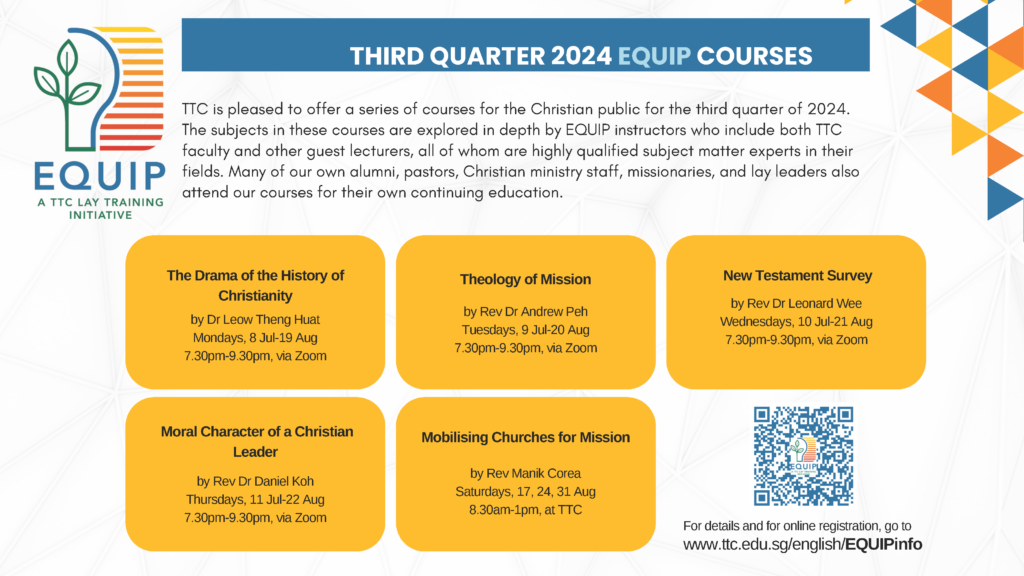The State of Christianity in Singapore: Causes for Concern

Pew Research Center is a nonpartisan research organization that studies public opinion and social trends. They do this by conducting surveys, analysing data, and conducting other research methods.
A research analysis published by the Pew Research Center on Oct 6 (https://tinyurl.com/yc4jaydd) suggests that Singapore’s religious diversity is “remarkable on a global scale”. This is because Singapore is one of the few countries in the world where people of different religions live together in harmony and mutual respect. It is positive to note this as a testament to the country’s commitment to religious freedom and tolerance.
You may also read a newspaper report of the research analysis here: https://tinyurl.com/muknxd.
“Focusing on the responses specific to Christians in Singapore,” Salt&Light highlights 10 causes of concern for the Church.
The concerns for the Church include observations that a substantial number of Christians in Singapore are not taking their faith seriously, not upholding the core tenets of Christianity (such as the belief in the one true God and the importance of evangelism) and not praying regularly.
The church in Singapore must navigate a complex landscape of challenges, including, inter alia:
-
Difficulty for the Church to reach people and share the gospel to a uniquely high number of Singaporeans who are identifying as non-religious. This difficulty is accentuated by poor apologetics and evangelism in the face of competitions for people’s attention and allegiance.
-
Difficulty for the Church to uphold its moral standards and to be a witness to Christ in a world that is becoming increasingly morally lax.
Being aware of the challenges, what can the church in Singapore do? Well, the church in Singapore refers to the Christians in Singapore who worship together, serve God together in their collaborative callings and build up the body of Christ together.
It is not going to be easy to address the challenges. Admittedly, I do not have an all-encompassing best solution. Here are just a few humble points which I hope will catalyse discussions and yield positive directions.
-
Be intentional about their faith: Christians need to be intentional about their faith and to grow in their knowledge of the Bible. They should also be prepared to defend their faith and to share the gospel with others.
-
Get involved in the church: Christians should get involved in their local church and support its ministries. They should also get involved in para-church ministries that are working to reach people with the gospel and to build up the church.
-
Prayer: Christians should pray for the church in Singapore and for its leaders. They should also pray for God to open doors for the gospel and to bless the work of the church.
In support of individual efforts
-
Better teaching: The church needs to do a better job of teaching its members about the core tenets of Christianity and the Bible.
-
Better sharing: The church needs to develop better ways to share the gospel in a way that is relevant and engaging, both from the pulpit and through the enabling of individual Christians for their outreach and evangelism.
-
Better environment: The church needs to create a welcoming and inclusive environment where people feel comfortable asking questions and exploring their faith.
-
Prayer: The church needs to pray for God’s help and guidance. The church cannot overcome these challenges on its own. It needs the power of the Holy Spirit to work in the hearts of its members and to reach out to the world around it.
What else?
-
Other ideas from readers: Share your bold ideas with the church. Good and effective ideas can be distilled out to profit everyone.
Give Thanks!
We thank God for the religious tolerance we have in Singapore, which promotes peace and harmony. In a society where people are free to practice their religion without fear of persecution, Christians can build relationships with people of other faiths and share the love of Christ with them in a respectful and loving way, even if our beliefs are not accepted or understood.
John Lee







Responses